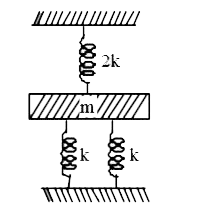Statement-1 : The periodic time of a hard spring is less as compared to that of a soft spring. Statement-2 : The periodic time depends upon the spring constant, and spring constant is large for hard spring
If both assertion and reason are true and the reason is the correct explanation of the assertion.
If both assertion and reason are true but reason is not the correct explanation of the assertion.
If assertion is true but reason is false.
If the assertion and reason both are false
The correct Answer is:A
Step by step video, text & image solution for Statement-1 : The periodic time of a hard spring is less as compared to that of a soft spring. Statement-2 : The periodic time depends upon the spring constant, and spring constant is large for hard spring by Physics experts to help you in doubts & scoring excellent marks in Class 11 exams.
Updated on:21/07/2023Topper's Solved these Questions
- SIMPLE HARMONIC MOTIONBOOK - ERRORLESS CHAPTER - SIMPLE HARMONIC MOTIONEXERCISE - simple Harmonic Motion
21 Videos
- SIMPLE HARMONIC MOTIONBOOK - ERRORLESS CHAPTER - SIMPLE HARMONIC MOTIONEXERCISE - Graphical Questions
16 Videos
- ROTATIONAL MOTIONBOOK - ERRORLESS CHAPTER - ROTATIONAL MOTIONEXERCISE - Practice Problems (Problems based on motion of connected mass)
10 Videos
- SURFACE TENSIONBOOK - ERRORLESS CHAPTER - SURFACE TENSIONEXERCISE - Exercise
214 Videos
Similar Questions
Knowledge Check
Assertion : The periodic time of hard spring is less its compared to that of soft string
Reason: The periodic time depend upon the spring constantAIf both assertion and reason are true and the reason is correct explanation of the assertionBIf both assertion and reason are true and but not the correct explanation of assertionCIf assertion is true but the reason is falseDIf both assertion and reason are falseTime period of a spring mass system can be changed by
Achanging the massBacclerating the point of suspension of the blockCcutting the spring (i.e.changing the length of the spring)Dimmersing the mass in a liquidStatement-I : Time period of spring block system is the same whether in an accelerated or in an inertial frame of reference.
Statement-II : Mass of the block of spring block system and spring constant of the spring are independent of the acceleration of the frame of reference.AStatement-I is true, Statement-Ii is true, Statement-II is a correct explanation for Statement-I.BStatement-I is true, Statement-II is true, Statement-II is NOT a correct explanantion for Statement-I.CStatement-I is true, Statement-II is falseDStatement-I is false, Statement-II is true
Which spring has greater value of spring constant a hard spring or a delicate spring?
View SolutionWhat will be the spring constant k of a. spring if length of the spring is made n times?
View SolutionWhat is the spring constant for the combination of spring shown in fig. ?

View SolutionIf two similar springs each of spring constant K1 are joined in series, the new spring constant and time period would be changed by a factor:
View SolutionA spring of constant K is cut into two parts of length in the ratio 2:3 . The spring constant of large spring is
View Solution
